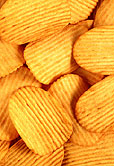
MONDAY, Jan. 7 (HealthDay News) — Binge eaters commonly prepare foods using a strange mixture of ingredients, such as mashed potatoes and Oreo cookies or chips with lemon, pork rinds, Italian dressing and salt, a new study says.
Researchers from the University of Alabama at Birmingham also found those who create these odd food concoctions are more likely to binge than people who just overeat. They say their findings could lead to a better understanding of this eating disorder, which affects millions of Americans who may be ashamed and hiding their behavior.
“Secrets can kill us,” study investigator Mary Boggiano, an associate professor in the department of psychology, said in a university news release. “The more secretive a patient is with aspects of an addiction or eating disorder, the worse off he or she will be because they will continue to engage in their secret, maladaptive behavior.”
The study involved 507 male and female psychology students from UAB and the University of Texas at El Paso, along with 45 people being treated on an outpatient basis for eating disorders in Cincinnati. Of the participants, 45.5 percent were white, 40 percent were Hispanic and 10 percent were black.
One of four participants secretly engaged in “concocting,” regardless of their gender or ethnicity. The study authors noted, however, that the actual number of binge eaters who engage in food concocting is likely to be higher than what was reported.
“We found significant numbers in a nonclinical population,” Boggiano explained. “If the same survey was given to people in a hospital, clinical or psychiatric setting, they would certainly report higher levels.”
Of those who concocted, about 41 percent prepared these strange mixtures of food due to a craving. Only 9 percent engaged in this type of behavior because they were hungry. The researchers said this finding was not surprising since most binges take place following a meal.
Moreover, most binge eaters said they felt “excited” and “anxious” while they were preparing their food concoctions. The researchers pointed out these emotions are similar to those reported by addicts while they are using drugs.
After concocting, binge eaters reported feeling shame and disgust. These negative emotions could exacerbate an eating disorder, the study’s authors cautioned.
“While they are food concocting and binge eating they report being excited, in a frenzy, and high, but afterwards they feel awful about themselves,” said Boggiano.
The study was published online recently in the International Journal of Eating Disorders.
More information
The U.S. National Institutes of Health provides more information on binge eating.

